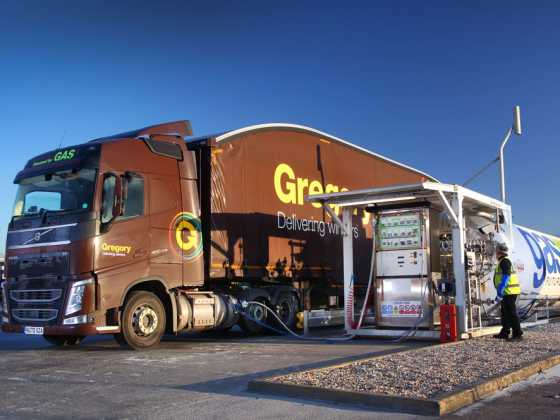Expert panel: vehicle technology and data

Many fleet operators will be thinking about the implications of the 2030 phase-out of petrol and diesel cars and vans. Switching to electric vehicles requires careful planning, and telematics can give fleet managers insight into whether or not they would be suitable. Our expert panelists discuss this and other ways technology and data can improve fleet operations
Expert panelists are Stuart Thomas, director of fleet and accident management, the AA; Sean Maher, UK field sales manager, Quartix; and Stuart Russell, LCV sales director, Europcar Van & Truck. Biographies below.
The government has brought forward the ban on sales of new petrol diesel vehicles from 2040 to 2030, although some hybrids, presumably PHEVs, will be allowed until 2035. The announcement comes following a concern voiced by the Committee on Climate Change (CCC) that the original 2040 date wasn’t soon enough to meet the net-zero target.
Despite the ban being nine years away, many fleets will be thinking carefully about the implications for their fleet. While the amount of electric vehicles and public charge points is growing, such a significant change requires careful planning. A fleet of electric vehicles can be a big expense due to the technology still being quite new. They also require a certain degree of behaviour change from the driver - range has to be taken into consideration, as well as whether it’s possible to charge on route.
Given these factors, it’s recommended that fleet managers have some kind of insight into whether or not electric vehicles would suite their operations before investing.
One way to do that is through telematics. Analysis of vehicle usage and performance data can show where vehicles could be swapped for an electrified version, and what the predicted cost and emission savings would be. This gives fleet buyers the inside knowledge they need to be able to switch to electric confidently.
“Connected vehicle data can help fleets to better understand their vehicle usage patterns, making smart decisions about where alternative fuels may be appropriate and what kind of charging or refuelling infrastructure will be required,” comments Stuart Thomas, AA director of fleet services and accident management. “Of course, there may still be challenges around payload of vans and initial purchase cost for certain vehicles within a fleet, but intelligent use of vehicle data can help identify the opportunities where fleet transformation will make a significant impact, such as vehicles which often go into low emission or clean air zones.”
Telematics can help identify savings too, in order to support the potentially expensive transition to an electric fleet, says Sean Maher, UK field sales manager at Quartix. “The initial outlay of switching to electric vehicles can be substantial,” he says. “That being said, a good telematics system can help businesses to identify savings that will support a potentially expensive transition – such as driving down fuel costs, reducing overtime and improving productivity.”
The University of Birmingham is an excellent case study of an organisation successfully switching to electric vehicles, points out Sean Maher. He explains: “The university pledged to convert its fleet of 100 vehicles to a 40 per cent electric fleet by 2020. To facilitate this shift, the team renewed vehicle leases that were coming to an end with an electric vehicle alternative wherever possible – focusing on the smaller, lower cost vehicles. As always with significant change, a degree of resistance was met from staff, but the operations manager, Chris Lane, worked hard to convince those who were unsure of the new technology. An electric vehicle was left on site for people to try out and become familiar with, which helped staff embrace the change. The University dedicated several parking spaces with three pin plug charging points so that the vehicles could be charged overnight.
“Switching to zero emission vehicles won Chris and the team several awards, including GreenFleet’s Public Sector Fleet Manager of the Year award in 2019. What’s more, they report to have had far fewer issues with the electric fleet than their internal combustion counterparts.”
While electric vehicles suit many applications, they may not be suitable for all fleet operations - in which case, telematics can still help fleets run as fuel efficiently and cost effectively as possible. “Where switching to electric vehicles is not an option, telematics systems can help businesses dramatically reduce the emissions of their existing fleet, through enabling managers to effectively coach drivers to use more eco-friendly driving techniques and eliminate unnecessary journeys,” comments Sean Maher.
Helping key worker fleets
Many fleet operators are categorised as key workers, delivering essential goods and services to keep the country running while the UK was in lockdown due to the
Covid-19 pandemic.
But operating during lockdown did throw up some challenges, such as driver shortages and reduced vehicle capacity. Having telematics data therefore gave fleet managers the insight to be able to run their operations efficiently.
Stuart Thomas explains: “Like many organisations, the AA maintained core operations throughout the height of lockdown, working with ambulance services to support their depots as well as keeping the country’s key workers moving. Throughout this period, we saw first-hand how important it is to have meaningful and actionable data and insights from your fleet. Understanding where vehicles and personnel spend their time, being able to deploy them quickly and efficiently where they are needed, and minimising risk in the process was a natural extension of our business as usual operations. For many organisations, getting hold of such data made a real difference to their efficiency.”
Many businesses had to adapt their operations during the pandemic and telematics helped facilitate that. Sean Maher explains: “Whether eliminating trips to the office or letting staff keep vehicles at home rather than picking them up at the start of a shift, businesses had to adapt their practices during the pandemic. Vehicle tracking has become even more vital now, as it facilitates the smooth-running of these new methods – efficiency and legitimate use of vehicles can be championed with a good vehicle tracking system.
“As staff contact is likely to be much less, vehicle tracking can be key to keeping businesses in touch with their drivers throughout the day. Businesses can monitor trips, as well as vehicle usage remotely, ensuring the vehicles are only used for business trips during the allotted time, and that they are driven responsibly.”
Deliveries saw a boom during lockdown; with all unessential retail closed, the UK took to shopping online. “This is where vehicle tracking comes in handy again - businesses deliver a better service for their customers when they have visibility of their fleet and they can organise the workload in an efficient way,” explains Sean Maher. “Whether this is sending the closest driver to a job, ensuring delivery routes aren’t crossing or setting up geofencing alerts so that items can be prepared when drivers are nearing the depot. Quartix’s utilisation dashboards can also be used to set daily KPIs for productivity, meaning managers can quickly react if targets aren’t being met throughout the day.”
Given the amount of uncertainty the ongoing pandemic brings, the role of flexible van rental, particularly in the logistics and construction sectors, has been very important over the last few months. Stuart Russell, LCV sales director at Europcar Van & Truck comments: “Rental - whether just for a day or two or for a longer term - offers an off balance sheet solution that does not require large initial cash outlay or extra funding. And this makes it ideal for companies that are looking to protect their cash and not have fleets sitting around that they may not need every day.”
To give long-term van and truck rental customers access to valuable insights to help improve driving behaviour and optimise fleet utilisation, Europcar Van and Truck have announced a new UK partnership with Geotab and SureCam to deliver telematics and video technology as a single, cost effective solution for the van and truck market.
Stuart Russell explains: “Available as an addition to Europcar’s Flex long-term van rentals, the in-vehicle technology offers fleet managers information via a personalised dashboard enabling them to understand driving habits and reward safe driving behaviours. Plus, in the case of an accident, not only is the fleet manager notified immediately but the video telematics offers indisputable evidence that can be used in the insurance claims process.”
“We are confident that together, these two technologies can help support the enormous challenges currently facing commercial fleets,” adds Stuart Russell.
Connectivity and cyber security
With an increase in vehicle connectivity and telematics data comes a rise in the risk of cyber security issues. There is the potential for hackers to access personal data, steal cars that use keyless entry, or even take control of technology for malicious reasons.
Cyber security is a relatively new challenge for fleet operators. A study conducted last year by Inmarsat showed that 64 per cent of businesses across the transport industry think that their processes to combat cybersecurity threats could be stronger, and two thirds (66 per cent) said more could be done to protect against data mishandling.
Telematics produces huge amounts of data - which could potentially be useful to a cyber criminal.
Sean Maher explains what fleets can do to protect themselves: “It’s important to take advice from IT teams regarding your business’ database and email protection. When it comes to your vehicle tracking data, there should be ways to decide how much data is available to a user, how long it is kept on the system for and you should have ways to block an unwanted user from accessing information.
“Having secure passwords and being vigilant when clicking on links from unknown sources – these are both key to preventing harmful cyber-attacks. At Quartix, we constantly enhance the tracking system’s password protection with new features, such as more complex password criteria and preventing a password from being entered incorrectly too many times. If a password is reset, all active sessions of that account will require the user to re-enter their password, keeping the data highly secure. As an added security measure, administrators can now force users to reset their password regularly, which we highly encourage fleet managers to do.”
The benefits of vehicle connectivity far outweigh the potential cyber security
threat, believes Stuart Thomas, but fleets should manage the risk. He says: “While the risks of malicious attacks are low, it is important for businesses to be aware of how their data is managed and where the vulnerabilities may lie. Wireless vehicle jacking is a possibility, albeit remote. There are differences between integrated and aftermarket systems, while fleets should also check into the encryption levels, where data servers are located and how security is validated. Internal policies should also be reviewed and updated, to ensure drivers understand their responsibilities when it comes to wiping data from vehicles.”
Embracing change
The way people view “mobility” is changing. Car ownership is getting less important, with modern mobility looking at other possibilities of travel such as car pooling, car clubs, ride sharing, bike hire, public transport, and even autonomous vehicles. Fleet management too is being looked at differently, with alternatives to vehicle ownership being investigated, and the use of different vehicle types for last mile logistics.
The pandemic especially has help focus the mind on efficiency and different ways of working. “The events of the last few months have called into question how organisations fund and manage their vehicle fleets,” comments Stuart Russell. “No longer does a fixed term lease feel ‘fit-for-purpose’, especially as early termination fees have made curtailing agreements painful. Indeed, a recent survey Europcar Mobility Group UK commissioned found that over half of fleet managers had to pay increased termination fees during the pandemic and nearly two thirds extended existing contracts due to issues with supply of new and replacement vehicles. It’s not surprising, therefore, that three quarters said that COVID-19 has required them to review their fleet’s acquisition policy.
“Central to making the right decisions is having access to reliable and up to the minute insight on driver behaviour as well as an overview of vehicle usage. That’s why Europcar has continued to focus on delivering good insight into rental vehicle usage through the Europcar One management information system, combined with our recent partnership with Geotab and SureCam to utilise the two companies’ telematics and video solution, thereby giving Europcar long-term van and truck rental customers access to valuable insight to help manage driving behaviour and optimise fleet utilisation.”
Taking action with data
With extra data comes the task of managing such information, which can be overwhelming for time-pressed fleet managers. Stuart Thomas comments: “Connectivity is integral to the rapidly evolving area of Mobility as a Service (MaaS) and the accelerated roll-out of electric vehicles. As vehicles become more complex, with ever-increasing safety systems and the roll-out of driver safety features on the way to autonomy, being able to manage, interpret and act on the data being generated is ever more significant.
“As we have emphasised for many years now, having the data is one thing but being able to do something meaningful with it is another. We firmly believe that fleets and businesses need to ensure they put in place the support to understand the data at their disposal so they can make decisions which have a positive impact on their organisation. It is easy to get overwhelmed with too much information; selecting the data which is relevant is a skill in and of itself.”
Data from telematics can give fleets a deeper understanding of incidents that happen. Sean Maher explains: “Having complete visibility of its fleet will always put a business in a better position. Safer roads, for example, can only really be achieved when driving styles are monitored, and this data has huge value for everyone. A great deal of pressure can come with driving for work, causing drivers to speed or drive erratically, putting themselves at risk – it’s an important issue to address. Quartix takes this notion further, by not only looking at when drivers exceed the speed limit, but also when they exceed the average speed for a particular road. This adds context to driver behaviour and paints a much clearer picture than simply whether or not a driver keeps within the legal speed limits.
“Context is something that comes up frequently in our discussions about how data can add value – you could look at high level results and make an assumption about why a driver was going a certain speed, why an accident happened, or why one of the team didn’t make a certain number of deliveries one day. But the specific data collected from a good vehicle tracking system can deepen your understanding of those events. You can see if that one driver consistently drives faster than the road users around them, or you can even tap into the dashcam footage of an incident of harsh braking to see why it was necessary.
“Journey times also offer valuable insight into how long is realistically needed for trips and how long jobs usually take at each stop. This knowledge informs a business’ decision and puts them more in touch with what happens out on the roads.”
Expert panelist biographies
Sean Maher, UK field sales manager, Quartix
Sean Maher is UK field sales manager at Quartix. He has been with Quartix for 11 years and in vehicle tracking for 18 years. Sean’s experience enables him to understand customer needs and help companies realise the savings that can been seen from operating a vehicle tracking system.
Stuart Thomas, director of fleet and accident management, the AA
With more than 25 years’ experience in the fleet sector, Stuart’s extensive knowledge of the industry comes from roles across contract hire, disposal and related fleet services. His experience includes working with organisations including Nissan Finance and Lombard. In 2000, Stuart joined The Automobile Association (AA), where he set about building industry-leading account management, business development and contact centre teams before being promoted to the role of director of fleet services. He is now responsible for managing all aspects of the AA’s fleet and accident management clients, delivering bespoke services to some of the UK’s largest fleets and most diverse business users.
Stuart Russell, LCV sales director, Europcar Van & Truck
Stuart Russell has 32 years’ experience in the rental industry and entered the van market in 2006. In his current role he is responsible for growing Europcar’s commercial vehicle services. He also plays an active part in helping to shape the industry through his role on the BVRLA’s Van Committee.






